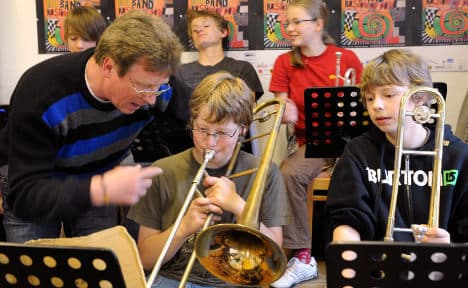Germans stop learning to play music

Few countries have produced more acclaimed classical composers than Germany. But there are discordant signs that the home of Bach, Beethoven, Wagner and Handel could be squandering its musical heritage.
The number of households where musical instruments are played has declined by nearly 30 percent over the past four years, according to a new survey which suggest instruments are falling silent or disappearing altogether.
Just 17.7 percent of households now make any of their own acoustic music, according to a study "Music-making and musical instruments in Germany", published on Wednesday.
The survey, commissioned by the Union of the Musical Instrument and Musical Equipment Industry (SOMM) and carried out by the independent Society for Consumer Research (GfK), was based on a representative poll of 11,000 Germans.
The rate of decline which it revealed should certainly set alarm bells ringing - as recently as 2008, 25.6 of households percent were still playing, meaning that the number of musical homes has declined by almost 30 percent in just four years.
"It´s terrifying how far these numbers have fallen," said Daniel Knöll, head of the instrument-maker´s union. "Instruments are just lying around in seven million households."
But it´s not only those with a financial interest in the musical trade who should be concerned. These figures cast some doubt on where the next generation of musicians will come from.
Although half of all children aged between six and eleven begin learning an instrument, less than half of those are still playing by the time they leave school. They often cite time pressures and rival interests as the reason for their abandonment.
A marked generation gap is opening up between the Mix-tape and the Facebook generations: a clear majority of those actively making music are now aged between 30 and 59.
Wider benefits from playing an instrument could also be lost. Picking up a violin or tinkering around with a keyboard are not only of a source of pleasure to many, but scientists now believe that regular practice could support a range of cognitive functions, from encouraging language development to helping overcome learning difficulties.
Of particular interest for a rapidly ageing society is the observation that making music appears to slow - or even prevent - mental deterioration in old age.
The solution, according to Knöll, starts in Germany´s schools.
"We need to bring music-making back into the schools," he said.
And perhaps the internet itself could provide part of the solution to young people´s lack of musical knowledge. According to Knöll, "video-tutorials are springing up all over the place."
DAPD/The Local/pmw
Comments
See Also
The number of households where musical instruments are played has declined by nearly 30 percent over the past four years, according to a new survey which suggest instruments are falling silent or disappearing altogether.
Just 17.7 percent of households now make any of their own acoustic music, according to a study "Music-making and musical instruments in Germany", published on Wednesday.
The survey, commissioned by the Union of the Musical Instrument and Musical Equipment Industry (SOMM) and carried out by the independent Society for Consumer Research (GfK), was based on a representative poll of 11,000 Germans.
The rate of decline which it revealed should certainly set alarm bells ringing - as recently as 2008, 25.6 of households percent were still playing, meaning that the number of musical homes has declined by almost 30 percent in just four years.
"It´s terrifying how far these numbers have fallen," said Daniel Knöll, head of the instrument-maker´s union. "Instruments are just lying around in seven million households."
But it´s not only those with a financial interest in the musical trade who should be concerned. These figures cast some doubt on where the next generation of musicians will come from.
Although half of all children aged between six and eleven begin learning an instrument, less than half of those are still playing by the time they leave school. They often cite time pressures and rival interests as the reason for their abandonment.
A marked generation gap is opening up between the Mix-tape and the Facebook generations: a clear majority of those actively making music are now aged between 30 and 59.
Wider benefits from playing an instrument could also be lost. Picking up a violin or tinkering around with a keyboard are not only of a source of pleasure to many, but scientists now believe that regular practice could support a range of cognitive functions, from encouraging language development to helping overcome learning difficulties.
Of particular interest for a rapidly ageing society is the observation that making music appears to slow - or even prevent - mental deterioration in old age.
The solution, according to Knöll, starts in Germany´s schools.
"We need to bring music-making back into the schools," he said.
And perhaps the internet itself could provide part of the solution to young people´s lack of musical knowledge. According to Knöll, "video-tutorials are springing up all over the place."
DAPD/The Local/pmw
Join the conversation in our comments section below. Share your own views and experience and if you have a question or suggestion for our journalists then email us at [email protected].
Please keep comments civil, constructive and on topic – and make sure to read our terms of use before getting involved.
Please log in here to leave a comment.